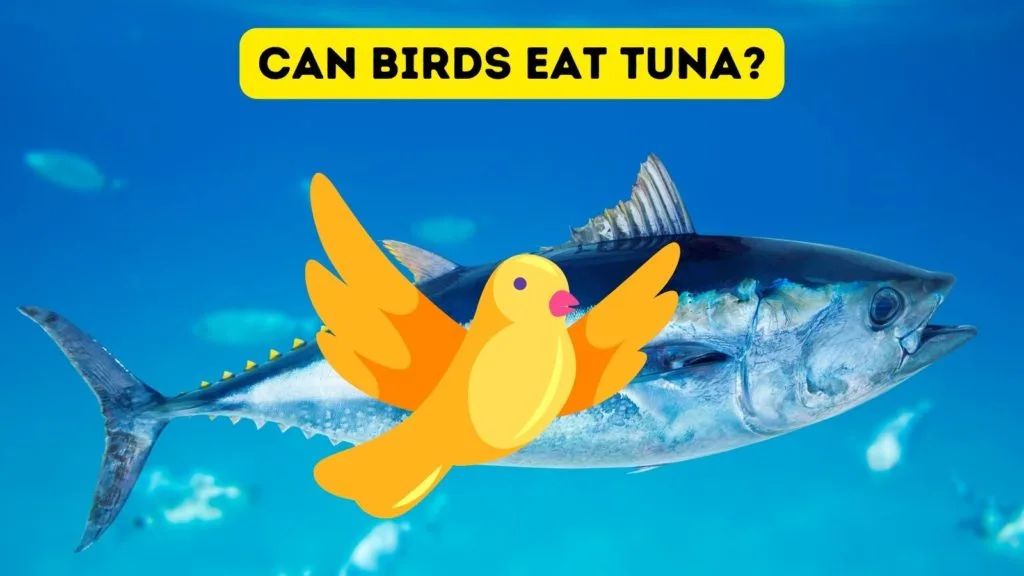Can birds eat tuna? Backyard birders with some tuna leftovers might be wondering if it’s safe to share. Tuna is a popular fish that is widely consumed by humans, but can it be safely fed to birds? Like so many bird questions, the answer is not straightforward and depends on various factors including the bird species you see in your backyard.

Which Birds Might Eat Tuna?
Tuna is not a natural part of most birds’ diets, as they typically consume insects, seeds, fruits, or small animals like fish.
However, certain opportunistic birds might scavenge or consume tuna if they come across it. This could include seabirds like seagulls, pelicans, or cormorants, especially if they find tuna scraps near fishing boats or processing facilities.
Additionally, some large birds of prey might also scavenge on tuna if they have access to it.
However, it’s worth noting that tuna isn’t a typical or recommended food source for birds, and they generally have other dietary preferences.
Nutritional Benefits of Tuna for Birds
If you are wondering whether birds can eat tuna, the answer is yes. In fact, tuna is a great source of protein and essential nutrients for bird species that might eat it.
Protein
Tuna is a high-protein food that can help birds maintain and build muscle mass. Protein is essential for birds’ growth, development, and overall health. Tuna contains all the essential amino acids that birds need to synthesize protein.
Omega-3 Fatty Acids
Tuna is also a good source of omega-3 fatty acids, which are essential for birds’ brain function, immune system, and cardiovascular health. Omega-3 fatty acids can also help reduce inflammation and improve feather quality in birds.
Vitamins and Minerals
Tuna contains several vitamins and minerals that are important for birds’ health, including vitamin B12, vitamin D, iron, and selenium. Vitamin B12 is essential for nerve function and red blood cell production, while vitamin D is necessary for calcium absorption and bone health. Iron is important for oxygen transport and energy production, while selenium is a powerful antioxidant that can help protect birds from oxidative stress.
Risks of Feeding Tuna to Birds
If you are considering feeding tuna to your feathered friend, there are some risks you should be aware of. While tuna can be a healthy and nutritious food for humans, it may not be the best choice for birds. Here are a few reasons why:
Mercury Content
Tuna can contain high levels of mercury, which can be toxic to birds. Mercury poisoning can cause neurological problems, including tremors and seizures, and can even be fatal in extreme cases. It is best to avoid feeding birds tuna or any other fish that may contain high levels of mercury.
Salt Levels
Tuna is also high in salt, which can be harmful to birds. Excessive salt intake can cause dehydration and kidney damage, and can even be fatal in some cases. If you do choose to feed birds tuna, be sure to rinse it thoroughly to remove excess salt.
Risk of Disease
Feeding birds raw or undercooked tuna can also put them at risk of contracting diseases such as salmonella or botulism. These diseases can cause severe illness or even death in birds, so it is important to cook tuna thoroughly before offering it.
In summary, while tuna can be a healthy and nutritious food for humans, it may not be the best choice for birds. If you do choose to feed your bird tuna, be sure to take precautions to reduce the risks of mercury poisoning, excessive salt intake, disease, and choking.
Types of Tuna Suitable for Birds
When it comes to feeding birds, tuna can be a great source of protein and omega-3 fatty acids. However, not all types of tuna are suitable for birds. In this section, we will discuss the different types of tuna that are safe and healthy for birds to eat.
Canned Tuna
It is important to choose canned tuna that is packed in water rather than oil. Tuna packed in oil can contain high levels of fat, which can be harmful to birds.
Additionally, some canned tuna may contain added salt or other preservatives, which can also be harmful to birds. Therefore, it is important to read the label carefully before feeding canned tuna to your bird.
Fresh Tuna

Fresh tuna is another option for feeding birds. However, it is important to choose fresh tuna that is sushi-grade or labeled as safe for human consumption.
Fresh tuna that is not sushi-grade can contain parasites or bacteria that can be harmful to birds. Additionally, it is important to remove any bones or skin from the tuna before feeding.
If you are looking for alternative protein sources for your birdfeeder, consider options such as mealworms. These options provide a more balanced nutritional profile and are safer for birds to consume.
In summary, while tuna is not toxic to birds, it is not recommended to feed it to them. Tuna contains high levels of mercury, which can be harmful to birds if consumed regularly. Additionally, tuna is not a natural part of a bird’s diet, and feeding it to them can disrupt their nutritional balance.
More Posts You Might Enjoy
- 8 Letter Bird Names - August 14, 2024
- 7 Letter Bird Names - August 14, 2024
- 7 Birds Named After Famous People - July 23, 2024
